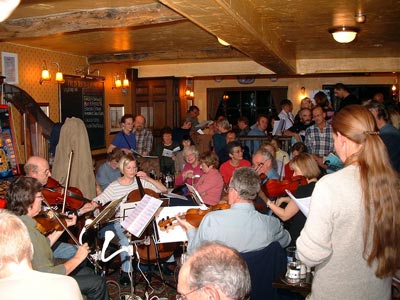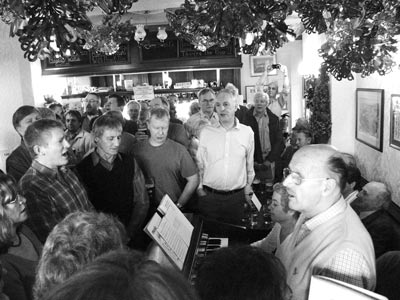Barry Callaghan's Introduction to the Carols
Long before our site existed, Barry Callaghan wrote a nice introduction to the carols for the South Riding Folk Network website. We linked to his article for many years. Sadly, the SRFN website appears to have closed, so here is the original text.
The Sheffield Carols
The mass singing in some of the pubs in North Sheffield and North Derbyshire, which takes place in the second half of November and all December, and which is often referred to as ‘The Sheffield Carols’, has been described as one of the most remarkable instances of popular traditional singing in the British Isles.
Local compositions, and Christmas songs that have been pushed out of the mainstream of our national carol repertoire with the adoption of the sanitised and limited group of ‘standard’ carols that now pours from our radios, tv, cd players, shopping malls and churches, have survived in these unofficial places, kept alive by the sheer love of singing of the participants.
Certainly, there are some people for whom the singing of these carols is a part of a Christian faith; but for the large majority of singers of the Sheffield Carols, it is the sheer love of singing, in the company of others, that attracts them. Packed in closer than an old-style football crowd, and with pint glasses in hand, singers roar out the unique repertoire of Christmas songs, sacred and profane, that have become such an essential part of Christmas for many people in the Sheffield area, and for many regular visitors from around the country and abroad.

These are not really for listening to — they are for singing. However, new visitors will not find themselves left out in the cold; many of the songs, though unfamiliar at first, are easy to pick up. At many places, books of words and music are available for purchase, and at the Travellers Rest at Oughtibridge, the words are put up on a flipchart at the front! A knowledge of the first three and last verses of ‘While Shepherds’ will give anyone a good start, since these words are regularly sung to about a dozen different tunes, and I believe that more than thirty tunes have been used to the words over the past forty years. Except that, in more than 35 years, I have never heard them sung to Winchester Old! Very occasionally, a ‘standard’ carol will creep in: there is an affection for in some places for ‘O Come All ye Faithful’, and ‘Silent Night’ is occasionally heard. Other songs however, are more idiosyncratic, and will take several visits to master: the obscure Victorian syntax of some still leaves puzzled looks around the room.
One of the chief characteristics of many of the tunes is the pattern known as ‘fuguing’ — a kind of call-and-answer repetition pattern towards the end of the verses, where the bass line answers the melody, and usually builds up a fair head of steam. ‘Mount Moriah’, ‘Old Foster’ and ‘Egypt’ are just three popular and spectacular examples. ‘Cranbrook’, which also shows this feature is a tune that is still heard for ‘While Shepherds’ — it is far more widely known to the world with the words of ‘Ilkley Moor B’aht At’ — words which hi-jacked the tune nearly a century after it was written for ‘While Shepherds’!

Another widespread feature is the ‘Symphony’, an instrumental part played as an introduction and between verses; these range from basic to elaborate. Most sessions are accompanied, typically by a piano or electric organ, although Grenoside has a string quartet; but several of the sessions are unaccompanied.
The Stannington sings are quieter, but good, and might interest those who don’t feel up to the rigours of Dungworth or Worrall.
There are many others, but many are informal and unpredictable and sometimes one-offs. News of these spreads from the principal sessions.
For a detailed schedule of sings, you can browse our calendar for carols only.
For more information, and access to a full library of recordings and publications, you can contact Village Carols, a non-profit organisation that exists to promote and record these carols. Village Carols publishes a number of excellent recordings from different carol traditions, and a selection of arrangements of tunes and words. They also organise a biennial festival: the next one is on Saturday 29 November 2008 at Grenoside Community Centre. Video films of previous festivals, including the special Millennium Festival at the Cutlers Hall, Sheffield, have been made by Garland Films in association with Village Carols, and are also available.
Village Carols can be contacted at: P.O. Box 2099 Sheffield S35 0XU http://www.villagecarols.org.uk/
A Few Words about Etiquette
If you are visiting the Sheffield Carols for the first time, you might find the following thoughts helpful. Firstly, they are very crowded, and at some of the most popular, it can be a fight to get into the singing room. So the first thing is, don’t go mob-handed. New singers are welcomed everywhere, and you will find people will share their enthusiasm with you freely; but if ten strangers appear in the middle of the room taking up valuable singing space, they will quickly feel uncomfortable. Try to go in not more than twos or threes, and if you can find an existing participant to go with, it will be easier still. Secondly, in many places there are not many seats, and these are often saved for more elderly regular singers; sensitivity here will help.
Having said this, it is always worth trying to get into the singing room; the Carols are a physical experience, and the involvement of being ‘in there’ is part of the appeal. In some places you can hear ok from the other bar, but it is a pale shadow.
Thirdly, the session will invariably include a few solos; quietness and respect for these is taken for granted. They do usually have choruses, though. And fourthly, moving to the bar and back can be extremely difficult, as can visiting the toilet. So be aware of people trying to move; and where you see empty glasses, pass them back towards the bar. You may be reminded of this in song at some places.
And finally, be sure to get to sessions in plenty of time. If you turn up at start time, you may well not get in, especially as it takes a certain confidence to push into the singing room after the singing has got going.
Mostly, enjoy it. If you haven’t been before, you may well find that it changes your perception of the festive season.
Barry Callaghan, 2002